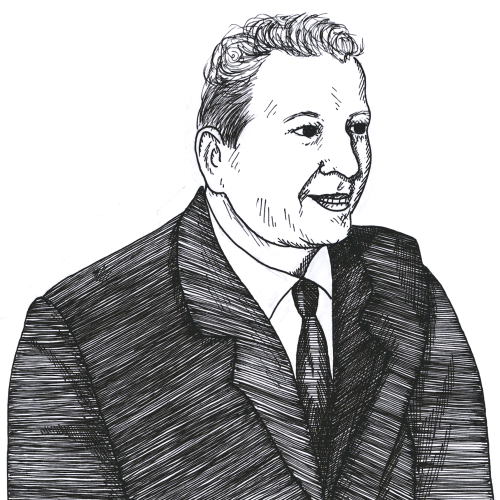Liberty Matters
Political Realism and Evolutionary Orders: Two Contrasting Ideas of State

Bruno Leoni was very interested in the study of politics, and at the University of Pavia he was the dean of the faculty of political sciences. He also created a bilingual academic journal, Il Politico (with articles in English and Italian), where he published important scholars of the time: Armen A. Alchian, Peter T. Bauer, James M. Buchanan, Friedrich A. von Hayek, Henry Hazlitt, Israel M. Kirzner, Fritz Machlup, Ludwig von Mises, Helmut Schoeck, Hans F. Sennholz, George Stigler, Leo Strauss, Gordon Tullock, and many others.
He was a philosopher of law, but for many years he also taught Dottrina dello Stato, a traditional course in public law that he used to introduce students to political science. We have the transcription of his lessons (unfortunately they have been published only in Italian),[40] and from these texts we see that his attitude was that of a realist.
Introducing his students to the analysis of politics, he described the relationship between rulers and governed as a rapporto disproduttivo, an unproductive relation. In his interpretation, there is a radical opposition between a voluntary exchange and a decision imposed. Using coercion, the ruling class affirms its own will: here we have no free agreement, and as a consequence, there is no improvement of either participant in the interaction. Usually, we have someone exploiting someone else.
Leoni knew well the Italian tradition of political science, where a central role was played by the "elitist school" of Gaetano Mosca and Vilfredo Pareto. He was aware that in our time, democracy is only a version of the modern state and a system to select the few people who will have the privilege of disposing of the rest of the society. When in Freedom and the Law he focused his attention on the democratic system, he emphasized how majority rule can destroy individual liberty.[41] In these pages it is clear that his libertarian attitude is strengthened by this realistic approach to politics.[42]
If he was so disenchanted with this description of the democratic state, how he could elaborate his theory of a political order emerging from the exchange of powers, since the norms are the consequences of the actions of people offering and supplying specific behaviors?
In his analyses of legal claims, Leoni showed that our acceptance of legislative rules was possible when the norms were in tune with the feelings and the interests of society. In a similar way, when he spoke about the political dimension, he intended to highlight that the vertical dimension of the institutional order of modernity (the modern state) implied the horizontal dimension of the network of spontaneous relationships supporting it. Each government would be unable to exist if it were only a top-down imposition.
For this reason he opposed two notions of state: the modern one, related to the concentration of power in our public law, and the original one, because before the logic of Westphalia the term state was used in reference to the general situation of a society, to the "state of affairs" of a political order, to the complex distribution of authorities, powers, capacities, etc. Leoni believed that if we wanted to understand the institutional pyramid of our time, based on the notion of sovereignty, we had also to analyze what is at the bottom supporting everything.
For this reason, this insistence on diffusion of the powers is necessary to understand even the entity which has monopolized power in modern times, what we now call the state. Moreover, this perspective can be useful to people – such as libertarians – interested in enlarging individual freedom and entering a different framework, where each political institution can be limited by the existence of other similar realities and a polycentric order can take the place of the state monopoly.
Endnotes
[40.] Bruno Leoni, Lezioni di dottrina dello Stato(Soveria Mannelli: Rubbettino, 2004 [1957]).
[41.] It is enough to read chapters 6 and 7 of Freedom and the Law. Chap. 6: Freedom and Representation </titles/920#lf0124_label_065> Chap. 7: Freedom and the Common Will </titles/920#lf0124_label_087>.
[42.] When he analyzed political science studies in Italy after the World War II, Mario Stoppino pointed out that the rebirth of the discipline was connected to four main people: Giuseppe Maranini, Giovanni Sartori, Gianfranco Miglio, and Bruno Leoni (Mario Stoppino, "Intervento," in Lorenzo Ornaghi and Alessandro Vitale, eds., Multiformità e unità della politica. Atti del convegno tenuto in occasione del 70° compleanno di Gianfranco Miglio, 24-24 October 1988 (Milan: Giuffrè, Milan, 1992) p. 233). The importance of Leoni for Italian political studies is now recognized by most scholars.
Copyright and Fair Use Statement
“Liberty Matters” is the copyright of Liberty Fund, Inc. This material is put on line to further the educational goals of Liberty Fund, Inc. These essays and responses may be quoted and otherwise used under “fair use” provisions for educational and academic purposes. To reprint these essays in course booklets requires the prior permission of Liberty Fund, Inc. Please contact oll@libertyfund.org if you have any questions.